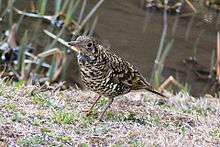Asian thrush
| Asian thrushes | |
|---|---|
 | |
| White's thrush (Zoothera aurea) | |
| Scientific classification | |
| Kingdom: | Animalia |
| Phylum: | Chordata |
| Class: | Aves |
| Order: | Passeriformes |
| Family: | Turdidae |
| Genus: | Zoothera Vigors, 1832 |
| Species | |
|
Some 35, see text | |
The Asian thrushes are medium-sized mostly insectivorous or omnivorous birds in the genus Zoothera of the thrush family, Turdidae. The genus name Zoothera comes from the Ancient Greek zoon, "animal" and theras, "hunter".[1]
Two New World species traditionally regarded as Zoothera; (varied thrush and Aztec thrush) actually belong elsewhere in the thrush family. A group containing Siberian thrush and the African species is not closely related to the other Zoothera and are now assigned to the genus Geokichla.
Species in taxonomic order
- Everett's thrush, Zoothera everetti
- Sunda thrush, Zoothera andromedae
- Alpine thrush, Zoothera mollissima
- Long-tailed thrush, Zoothera dixoni
- Scaly thrush, Zoothera dauma
- Amami thrush, Zoothera (dauma) major
- White's thrush, Zoothera aurea
- Nilgiri thrush, Zoothera neilgherriensis
- Sri Lanka thrush, Zoothera imbricata
- Fawn-breasted thrush, Zoothera machiki
- Bassian thrush, Zoothera lunulata
- Russet-tailed thrush, Zoothera heinei
- Black-backed thrush, Zoothera talaseae
- Makira thrush, Zoothera margaretae
- Guadalcanal thrush, Zoothera turipavae
- Long-billed thrush, Zoothera monticola
- Dark-sided thrush, Zoothera marginata
- Bonin thrush, Zoothera terrestris - extinct (c. 1830s)
- Himalayan thrush, Zoothera salimalii[4]
- Sichuan thrush, Zoothera griseiceps
Traditional Zoothera species belonging elsewhere in family
- Varied thrush, Ixoreus naevius - related to other new world genera
- Aztec thrush, Ridgwayia pinicola - related to Hylocichla
Geokichla thrushes
- Slaty-backed thrush, Geokichla schistacea
- Pied thrush, Geokichla wardii
- Ashy thrush, Geokichla cinerea
- Orange-sided thrush, Geokichla peronii
- Orange-headed thrush, Geokichla citrina
- Spot-winged thrush, Geokichla spiloptera
- Siberian thrush, Geokichla sibirica
- Abyssinian ground thrush, Geokichla piaggiae
- Kivu ground thrush, Geokichla piaggiae tanganjicae
- Crossley's ground thrush, Geokichla crossleyi
- Orange ground thrush, Geokichla gurneyi
- Black-eared ground thrush, Geokichla cameronensis
- Grey ground thrush, Geokichla princei
- Spotted ground thrush, Geokichla guttata - formerly G. fischeri
- Oberländer's ground thrush, Geokichla oberlaenderi
- Buru thrush, Geokichla dumasi
- Seram thrush, Geokichla joiceyi
- Chestnut-capped thrush, Geokichla interpres
- Enggano thrush, Geokichla leucolaema
- Red-backed thrush, Geokichla erythronota
- Red-and-black thrush, Geokichla mendeni
- Chestnut-backed thrush, Geokichla dohertyi
References
- ↑ Jobling, James A (2010). The Helm Dictionary of Scientific Bird Names. London: Christopher Helm. p. 414. ISBN 978-1-4081-2501-4.
- ↑ Olsson U.,Alström P. (2013). Molecular evidence suggests that the enigmatic Sulawesi endemic Geomalia heinrichi belongs in the genus Zoothera (Turdidae, Aves). Chinese Birds 4 (2): 155–160.
- ↑ Gill F. and Donsker D. (eds), Family Turdidae in «IOC World Bird Names (ver 4.1)», International Ornithologists’ Union, 2014.
- ↑ "New species of bird discovered in India and China". phys.org. Retrieved 12 January 2017.
Further reading
- Klicka, J., G. Voelker, and G.M. Spellman. 2005.A molecular phylogenetic analysis of the ‘‘true thrushes’’ (Aves: Turdinae). Molecular Phylogenetics and Evolution 34: 486–500.
- Sangster, G., J.M. Collinson, P.-A. Crochet, A.G. Knox, D.T. Parkin, L. Svensson, and S.C. Votier. 2011. Taxonomic recommendations for British birds: seventh report. Ibis 153: 883-892.
- Voelker, G., and J. Klicka. 2008. Systematics of Zoothera thrushes, and a synthesis of true thrush molecular systematic relationships. Molecular Phylogenetics and Evolution 49: 377–381.
- Voelke, G., and R.K. Outlaw. 2008. Establishing a perimeter position: speciation around the Indian Ocean Basin. Journal of Evolutionary Biology 21: 1779–1788.
External links
| Wikimedia Commons has media related to Zoothera. |
- Asian thrush videos on the Internet Bird Collection
This article is issued from
Wikipedia.
The text is licensed under Creative Commons - Attribution - Sharealike.
Additional terms may apply for the media files.